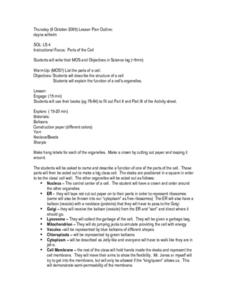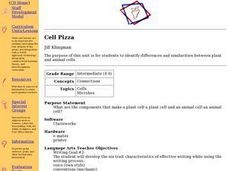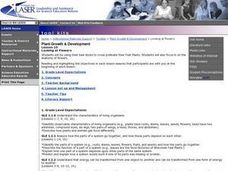Curated OER
Garden of Eden
Students view a video clip about animals and their habitats. They work together to discuss how different animals adapt to their environments. They create a new habitat for a specific animal and draw new adaptations for them.
Curated OER
Plants and Animals
Students find common needs between plants and animals. In this plants and animals instructional activity students compare that both plants and animals need food and water. They also find the differences between plant and animal needs.
Curated OER
Milk and Monarch Butterfly Mania Journal Entry
In this milk and monarch butterfly mania journal entry learning exercise, students write a scientific journal entry about the milkweed plant, using the information from another linked website. This learning exercise includes many links...
Curated OER
Introducing the Use of Dichotomous Keys to Students
Students are introduced to the use of dichotomous keys as a simple means of beginning scientific observations in nature. They comprehend how to use a dichotomous key. Students distinguish characteristics of a group of organisms. They...
Curated OER
Changing Cicada
Students discuss inherited traits and relate to the inherited traits in a cicada. In this cicada instructional activity, students follow the life cycle of the cicada and observe the changes as it grows. Students discuss the...
Curated OER
The Bottom Line
Seventh graders assume the role of stockholders in a fictitious biotech company. After investigating the cloning of pets, the effects of cloning on the health and well being of the cloned animal, and the ethical issues involved, groups...
Curated OER
Species Diversity in Ecosystems with Different Techniques of Land Management
Students visit numerous places to help in their understanding of Ecology. In this biology lesson plan, students will learn about characteristics and how to identify numerous plants and animals. This instructional activity allows for many...
Curated OER
Understanding Science Vocabulary And Categorization
Learners explore and examine scientific language and categorization as related to commonly known plants and animals. They hypothesize about a specific plant or animal, how it was scientifically named, what concepts and vocabulary is...
Curated OER
Native American Legends, Folk Stories and Tales
Students write an Indian tale explaining a natural event, an animal characteristic,
Curated OER
Rainforests: What Are They?
Second graders investigate rain forests by reading a habitat checklist. In this environment lesson, 2nd graders read the book The Great Kapok Tree, and discuss what characteristics make up a rain forest. Students explore a habitat...
Curated OER
Reading "Beetles, Bees and Butterflys"
Reading information about beetles, bees, and butterflies is the focus of this science worksheet. Students apply vocabulary and comprehension skills in order to answer six questions based on the reading.
Curated OER
Flora and Fauna of the Hill Neighborhood
High schoolers compare and contrast the characteristics of plants and animals. In this ecology lesson plan, students observe the outdoors and describe the relationship among different living things. They relate plant diversity with...
Curated OER
Eukaryotes vs. Prokaryotes
Seven simple slides list characteristics of eukaryotic and prokaryotic cells. After viewing this presentation, future biologists will be also able to name the unique characteristics of plant, animal, and fungal cells. Ideally, you would...
Curated OER
The Five Kingdoms
An overview of the five kingdoms within the biological classification system is presented in this set of five slides. The first lists the objectives of the slide show, and the second gives general characteristics of plant, animal, and...
Curated OER
Life at Risk
Students examine the characteristics of the peregrine falcon. They investigate endangered and extinct species, and how the environment affects the process.
Curated OER
Major Functions
Seventh graders investigate the basic characteristics and needs of living things. They identify the major parts of plants and animals by making lists. Students focus upon one living thing and speculate how if one part is changed how it...
Curated OER
Cell Structures and Functions
Fifth graders search into animal and cell characteristics and their functions in this seven lesson plan unit. Replicas of the cell are constructed out of Jell-O as students probe the internet for details of the concepts.
Curated OER
Parts of the Cell
High schoolers examine plant and animal cells to observe the organelles present in the cell, to match the function of each to the organelle on a cell model and to build a model of the plant or animal cell.
Alabama Learning Exchange
It's a Small, Small World
Learners compare and contrast the different characteristics of animal-like, plant-like, and fungus-like protists. They list examples and describe the characteristics shared by the three protist groups. They create a brochure or slideshow...
Curated OER
Cell Pizza
Students identify parts and functions of microscope. Students watch video, Cells and Life about cell parts with actual pictures and actual cells. Students discuss video and identify parts of the cells that animals and plants have in...
Curated OER
Invertebrates
Learners identify the characteristics common to all animals. In groups, they compare the characteristics between the animals and how they are divided. To end the lesson, they compare the eight phyla of invertebrates and review the...
Curated OER
Classify UT Plants and Animals
Students practice using 2 different plant classification keys to identify species. They make choices between the similarities and differences between their object and the classification scheme.
Curated OER
Plankton
Students explore the attributes of plankton. In this plankton lesson plan, students read This is the Sea That Feeds Us and discuss food chains. Students discover the differences between phytoplankton and zooplankton as they examine the...
Curated OER
Looking at Flowers
Students use their bee sticks to cross-pollinate their Fast Plants and also focus in on the anatomy of flowers. They analyze how the parts of a system go together, and how these parts depend on each other. Finally, students describe...

























